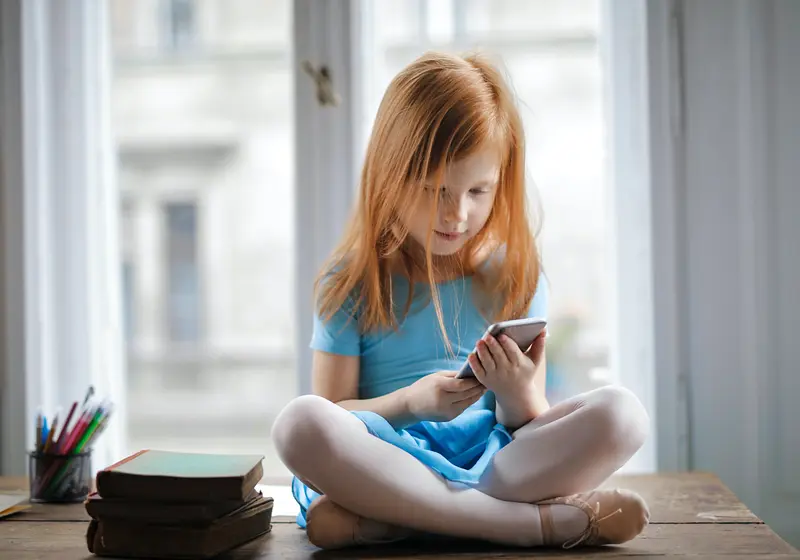How often are you attracted to someone just based on looks? If you're being honest, probably most of the time. That was how seven-year-old Juli Baker fell in love with Bryce Loski in Wendelin Van Drannen’s Flipped. But this beautiful childhood crush is nothing but a nuisance to Bryce.
Why? Because Bryce’s problem is that kindness and sincerity are nothing short of trash. He only cares if Juli is pretty or popular, and hates that she is lower class with a messy front yard.
Teens tend to overvalue their own outer appearance and that of others, just like Bryce did with Juli. That’s why Flipped offers teens an important lesson about appearance and reality, especially when it comes to how teens think about themselves in relation to technology.
The setting of the novel is pre-smartphone, so there were no continuous notifications from messages and emails and rapid exchanges of information on social media. However, it is different now. Technology has changed the way teens live, communicate, and, most importantly, perceive other people. While people’s appearance is only partially in their control, it is, perhaps unfortunately, the first way others make a judgment— especially teens.
Understanding the role technology plays in our lives is important, and only by thinking more about its particular effects can we see what the novel has to teach us.
Let us slide into your dms 🥰
Get notified of top trending articles like this one every week! (we won't spam you)Can We “Flip” Ourselves and Save Another Lost Generation?
In Neil Postman’s 1998 speech Five Things We Need To Know About Technological Changes, he argues that while technology brings advantages, it brings disadvantages, as well. He claims that some people are the clear winners and losers of new technology, and those who win are usually large-scale corporations.
In the meantime, individuals are the typical losers, but are constantly told by big companies they are the winners. Postman shows that technology is never neutral, and therefore affects individuals, because each type of media has its own set of values.
More importantly, much of tech devalues the more meaningful side of our lives, and Postman shows how the advantages of tech might not be outweighed by the negatives. In addition, he claims that tech is so ubiquitous that many people don’t even question it in their environment– it's like the sky or a tree. It’s just there, but with a dangerous side. And I agree.
Teens are even more susceptible than adults to the effects Postman outlines in his speech. The result isn’t just foreseeable; it is happening now.

Take the Quiz: Which Generation Matches Your Personality?
Discover the generation you truly belong to!
Posting Ourselves to Death
Technology is easily accessible and widespread in use, which is presented to us as positive. Don't get me wrong: there are positives. But we have to recognize that teens are also negatively influenced, because they are still struggling on the way to finding their true, inner value.
I believe that teens do want meaning, but I see that technology, especially social media, distracts us from our inner voice, our true self. Before the internet, teens did not see a nearly endless stream of so-called perfect people. Being constantly on the internet creates anxiety in teenagers, causes them to judge each other more harshly than even Juli and Bryce, and it keeps them from discovering their own and others' inner values.
For those who only see the advantage of the tech, the anxiety caused by social media does not seem that important. Teens want to share their lives online, but sharing has its dark side. Many feel like they must share the prettiest sides of themselves.
In most conditions, it starts with a desire to build up a flawless public image, but it has then grown into a competition in which everyone devotes everything to win. Tech-driven peer pressure is a powerful motivation for most teens, because what they post online determines if they are the most popular kids in the grade. The symptoms of this vicious cycle may not be obvious, but they are definitely severe.
Social media has shifted teens’ attention to outer values in an extreme way; teens use technology even more frequently to check and ensure their social status. This will eventually hurt them, both physically and mentally, and will also define their values by outside influences instead of more important sources of meaning like family, culture, and religions.
When people want to have a better body shape than others, the desire to win drives them to extreme methods, such as starving themselves until they cannot bear it anymore. When some teens drive a Toyota while others drive a Mercedes or a Porsche, they may start resenting their parents. You might not think these examples are big deals at all, but they are the biggest contributing factors to teens’ health and anxiety issues.
The Flipped Connection to Social Media and Finding Your True Self
In Flipped, Bryce is fortunate because his grandfather tries to teach him to look beyond surface images, beyond fancy clothes and social status to a person’s inner, true self. There needs to be someone to lead this generation to a path of discovery, which in turn leads them to the real significance of their lives. If our brains are occupied with appearance and money, then our understandings of philosophy, religion, culture, and especially ourselves will gradually diminish.
If teens are the future, then our future might become a building that is composed of the most colorful walls and exquisite decorations but lacks a foundation. Eventually, it will fall apart. That is, unless we can flip.
The path to meaning has often appeared vague and elusive to young people even without tech, and they tend to grasp the clearer, or easier, path— one of material status. But we can change our minds.
Social media occupies 80% of teens' lives, so it is not surprising that our culture is mostly characterized by materialism, casual relationships, and entertainment. That is why many teens struggle to create long-term goals, explore their personal significance, and discover a meaningful position in this world. Most teens struggle to find a belief in what is lasting or true— this is made worse by social media.
The substitutes teens find for personal value are often faked, altered, and impermanent. On the internet, great pictures could be photoshopped; beautiful faces and bodies could be the outcome of plastic surgery; seemingly rich lifestyles could be a lie; and so on. In real life, teens don’t know if the person on the other side of the screen has the things they present in their online image.
Technology is destroying this generation; in other words, it is destroying everyone’s future. That is why many teens do know the meaning of their lives.
However, this is not entirely our fault; we barely have any choice under the current tech-controlled circumstances. And not every teen is as lucky to have a grandfather like Bryce’s, an adult who helps them understand what is valuable in this world.
Living with Intention in a Superficial Age
While teens, of course, can choose to be off social media, there is such a high pressure to be on it and there is an incredible pressure to use technology for everything, including important documents, school work, and even our classes, that it’s become almost a part of us; we can’t imagine life without it. That is also why adults need to be more educated about technology and involved in teens' use of social media.
Because teens are in a state of figuring themselves out and exploring, they need adults who can guide them and have parental support through times of peer pressure.
If there is a lesson we can learn from Flipped, it is that teens should learn how to judge their own selves before judging another. Teens are prone to make quick assessments based on appearances, and there needs to be responsible adults who show them another way of valuing themselves and the world. Most importantly, we need to learn how to walk in other peoples’ worlds, too.










